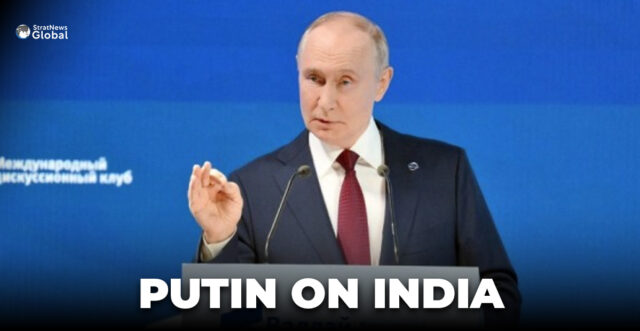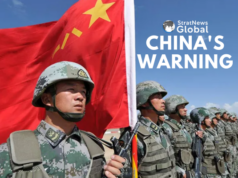Russian President Vladimir Putin placed India firmly at the centre of Moscow’s foreign and economic policy priorities during his keynote appearance at the Valdai Discussion Club in Sochi on Thursday, October 2, 2025.
In a session that touched on U.S. pressure campaigns, trade balances, and upcoming diplomatic engagements, he repeatedly singled out New Delhi as a partner that Russia could trust and depend upon.
Responding to a question on Washington’s growing attempts to push countries such as China and India to scale back purchases of Russian raw materials and energy, Putin dismissed the idea as both counterproductive and harmful to the U.S. itself.
If tariffs were imposed on goods from countries trading with Russia, American consumers would ultimately pay higher prices due to shortages and inflated logistics costs, he explained. “There’s no politics here; it’s pure economic calculation,” he argued, warning that such measures would lead to sustained inflationary pressures in the U.S. and slow its own economy.
Specifically addressing India, Putin underlined the costs New Delhi would face if it were to bow to American pressure. “If India refuses our energy carriers, it will suffer certain damage, up to $9–10 billion by some estimates,” he said. “And if it doesn’t refuse, then sanctions in the form of high duties will be imposed – and there will also be damage. What will it be? About the same. Then why refuse, if you also have to bear huge domestic political costs?” Besides, the Indian people would never accept a leadership decision that could be perceived as humiliating, and that Prime Minister Narendra Modi would not take such steps, he added.
Putin contrasted Washington’s demands on others with its own actions in the nuclear sector. While urging allies to boycott Russian energy, the U.S. continues to import uranium from Russia for its nuclear power plants. Moscow currently supplies about 25 per cent of U.S. uranium needs, trailing only a U.S.-European consortium that covers around 60 per cent. Russian uranium sales to the U.S. earned Moscow nearly $800 million in the first half of 2025 alone, with annual revenues expected to exceed $1.2 billion. “The Americans buy our uranium because it’s beneficial. And they’re right to do so; we are ready to continue these supplies stably and reliably,” he said.
The Russian leader also looked ahead to his scheduled December visit to India, framing it as a key moment to advance bilateral relations. He described ties between Moscow and New Delhi as having a “special character” dating back to the Soviet era and emphasised that the two states had “never had any problems or interstate frictions at all.”
“Our current trade turnover with India is about $63 billion. India has one and a half billion people, while Belarus has ten [million]. But with Belarus, the turnover is $50 billion, and with India – 63. This clearly does not correspond to our potential capabilities,” he observed. Putin called for solutions to logistical challenges, payment mechanisms, and trade imbalances, pointing to BRICS instruments, bilateral rupee settlements, and electronic payments as possible avenues.
He revealed that Deputy Prime Minister Denis Manturov had been tasked with developing new proposals, together with Indian counterparts, to expand cooperation and address the imbalance. “Together with our Indian friends and partners, we are thinking about how to refine this trade turnover,” he said.
On the political front, Putin stressed that Russia and India coordinate closely in the international arena. “We practically always coordinate our actions. We always listen to and take into account the position of our countries on key issues,” he said, noting the close working relationship between the two foreign ministries.
Cultural and educational ties were also highlighted. Putin pointed to the steady presence of Indian students in Russian universities and the enduring popularity of Bollywood films in Russia. “We are probably the only country in the world, besides India, that on a permanent basis runs an entire channel of Indian films, day and night,” he remarked.
In the defence sphere, he underscored cooperation in joint weapons production, describing it as further proof of the trust underpinning the strategic partnership. “We are engaged in joint production of some very modern and promising types of weapons,” Putin said.
Closing his remarks, the Russian president described his relationship with Modi as personal as well as strategic. “I am looking forward to this trip in early December to meet my friend and reliable partner, Prime Minister Modi,” he concluded.
In a career spanning three decades and counting, Ramananda (Ram to his friends) has been the foreign editor of The Telegraph, Outlook Magazine and the New Indian Express. He helped set up rediff.com’s editorial operations in San Jose and New York, helmed sify.com, and was the founder editor of India.com.
His work has featured in national and international publications like the Al Jazeera Centre for Studies, Global Times and Ashahi Shimbun. But his one constant over all these years, he says, has been the attempt to understand rising India’s place in the world.
He can rustle up a mean salad, his oil-less pepper chicken is to die for, and all it takes is some beer and rhythm and blues to rock his soul.
Talk to him about foreign and strategic affairs, media, South Asia, China, and of course India.





